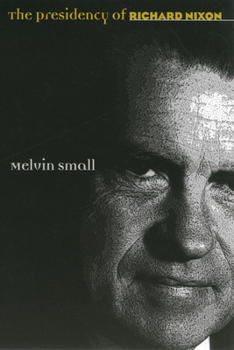The Presidency of Richard Nixon
(Part of the American Presidency Series Series)
Select Format
Select Condition 
Book Overview
Twenty-five years after Richard Nixon resigned from office, his legacy remains shrouded in controversy. His was a complex, inconsistent, and even contradictory presidency, shaped by the man's personality and political practices and played out during one of America's most turbulent eras. Melvin Small now draws on the latest archival releases to take a fresh look at Nixon and place his administration in proper historical perspective. Nixon once predicted that by the year 2000 scholars would begin to evaluate his presidency more favorably. Small, however, steers a steady course between Nixon's detractors and apologists to offer the most balanced and thorough coverage yet available of the man's character and accomplishments. He notes many of the solid achievements of Nixon's domestic programs while criticizing some of his more celebrated foreign policies, especially concerning the Third World, and illuminates Nixon's broader influence on American political institutions and culture. Small's topical approach permits readers to observe the development of an entire domestic program or international relationship over an extended period, making it easier to understand such drawn-out issues as reforming welfare or ending the Vietnam War. Regarding Vietnam, Small integrates military and diplomatic policy with Nixon's efforts to neutralize the antiwar movement. His coverage of White House operations and Nixon's war with the media precedes a particularly insightful chapter on Watergate and the threat of impeachment. A closing chapter on Nixon's post-presidential years reveals facts about his health and his "blackmailing" of both Presidents Bush and Clinton, and a bibliographic essay provides an extensive survey of the Nixon literature. He was the first president to travel to China and to call for welfare reform, and although he left Washington under a cloud, many of Nixon's ideas and policies have been embraced by Americans--a legacy few presidents can claim. Small's book is a lively and anecdotal account that looks at the many sides of Richard Nixon and comes to grips with both the man and his presidency.
Format:Paperback
Language:English
ISBN:0700612556
ISBN13:9780700612550
Release Date:September 1999
Publisher:University Press of Kansas
Length:408 Pages
Weight:1.30 lbs.
Dimensions:0.9" x 6.4" x 9.0"
Customer Reviews
2 ratings
Fair and useful
Published by Thriftbooks.com User , 16 years ago
Helpful. Interesting. Smart, strange man who overcomes dislike of people to run incredibly large country of people. More effective on Vietnam than given credit for. Problem with honesty.
Balanced look at Richard Nixon
Published by Thriftbooks.com User , 17 years ago
I read this book for a graduate class in American history. Few U.S. presidents have had as many books written about them and their administrations as Richard Milhous Nixon. Nixon's presidency was defined by the historian Stephen E. Ambrose as a Shakespearean tragedy. Nixon is credited by many historians with great success in foreign and domestic policy. These achievements by themselves would normally rank him near the top of the list of America's great presidents. However, his psychological deficiencies were responsible for dragging the country through its worst constitutional crisis in its history--Watergate. Nixon's involvement in the Watergate cover up culminated in his being the only president to resign from office. This saved him from the humiliation of surely becoming the only president who would have been impeached and thrown out of office. It is against this historical backdrop, that Melvin Small wrote The Presidency of Richard Nixon. Small succeeded in writing an objectively fair history of America's thirty-seventh president. At the end of his book, Small astutely noted why a history of Nixon is so important. "The period from the end of World War II to the end of the cold war was in good measure an age of Nixon" (311). No historian writing about Nixon can avoid trying to understand and explain his psychological profile. One would think with all the biographies from historians and memoirs from close aides, the voluminous presidential papers, and thousands of hours of tape recordings, one could get a clear understanding of Nixon's psyche. Most historians and close friends and aides of Nixon still admit that they never fully understood him. Both Nixon historians Theodore H. White and Nixon speechwriter William Safire, wrote that they were still perplexed by Nixon's multi-faceted psyche. Small recognized this conundrum while writing his biography, and like most biographers, searched Nixon's early life and upbringing to try to understand his psychological character traits. Nixon was born on January 9, 1913 in Yorba Linda, California. He was the second of five brothers. Two of his brothers died from respiratory diseases. Nixon remarked that these traumatic events in his life caused him to champion the government's involvement in health care. Nixon's family was lower middle class Quaker. During the Depression they struggled like millions of other families. Richard was an intelligent child who learned to read before entering grade school. He had a photographic memory that allowed him to excel in both his academic and political careers. He was famous for remembering the names of thousands of politicians from across the country and could memorize speeches; thus making it seem he was talking extemporaneously. Although he had the grades to attend a more prestigious college, due to financial considerations, Nixon settled on attending Whittier, a local college. He graduated second in his class in 1934, and received a parti






